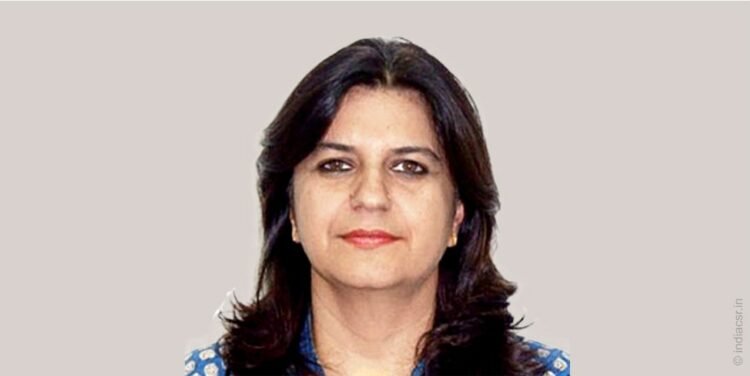Child education and malnutrition as well as empowering women through skill development are important priorities for the government. Vedanta, a mining and metal group, has joined hands with Ministry of Women and Child Development to modernize 4,000 anganwadis operating as part of the Integrated Child Development Scheme (ICDS).
This initiative is a first of its kind PPP model and has led to opening of several refurbished services centres across the country. These centres have been modernized using state of art construction technology and have round the clock electricity through solar panels, e-learning in a stimulating environment and clean drinking water through RO purifiers.
The Nand Ghars are also equipped with teaching aids, dedicated kitchen and hygienic toilets. These Nand Ghars are currently operational in Uttar Pradesh, Rajasthan and Madhya Pradesh. We would also be pleased to have Vedanta officials share their vision and the efforts that are being made to transform anganwadis.
In an interview with Rusen Kumar, Editor, India CSR Network; Ritu Jhingon, Head, Project Nand Ghar said, “Nand Ghar is a first-of-its-kind PPP CSR model in partnership with the government, which has the potential to become a movement for a holistic approach towards child care and women empowerment..” Edited Excerpts:
How did Vedanta Resources partner with the Government’s Anganwadi project?
Mr Anil Agarwal, Chairman, Vedanta Resources, strongly believes in the role of natural resources sector towards poverty alleviation and nation building. Women and Child development has thus been at the core of Mr Agarwal’s philanthropic initiatives. At Vedanta, we have focused on women and child development as the core of our CSR programs. Vedanta has a legacy of working with Anganwadis across Rajsthan, Odisha, Tamil Nadu and Chhattisgarh. With Nand Ghar we aim to transform Anganwadis across India and contributing to Hon’ble Prime Minister’s national vision to eradicate child malnutrition and provide education, healthcare and skill development.
What has been the experience of partnering with the Government?
It was a right fit, just the kind of partnership we were looking for. We believe that much more good can be done in India if, instead of the government going it alone and the private sector doing something independently or a collaborative partnership between the two parties is arrived at. Partnership with government can ensure long term sustainability of program as well as ensure optimum utilization of resources available through CSR. Governments can be proactive partners with corporate by developing regional development plans and invite corporates who can add value to the plan. This can be a winning model for Public private partnership.
Vedanta’s first modern Anganwadi – Nand Ghar – was inaugurated on 24 June 2015, by the Union Minister of Women and Child Development, Smt Maneka Sanjay Gandhi. The Minister appreciated the committed efforts by the Vedanta Foundation towards setting up of 4,000 Nand Ghars in the country.
The Nand Ghar initiative also won for Vedanta the India CSR Award of Appreciation for Innovative CSR Practice and Impact to Society.
Do you think society urgently needs a partnership working model for CSR implementation?
Indeed, such a model would make things easier, because then, both the private corporates as well as the public bodies would know how to find just the right partner who would be ideally suited to their mission. It’s only when one works with the right partner that one can hope to continue the work for a longer time and make a lasting impact at the grassroot level. We believe partners can bring in much needed domain expertise to the table needed for maximizing impact. At Vedanta, we believe in maximizing the social return on our investment and partnership is a key enabler towards the same. Nand Ghar is a first-of-its-kind PPP CSR model in partnership with the government, which has the potential to become a movement for a holistic approach towards child care and women empowerment.
Vedanta’s Nand Ghar Project began as a mission favouring children’s development. However, it soon began helping the womenfolk of the village as well. How did that happen?
Vedanta Chairman Mr Anil Agarwal believes that both the society as well as the nation cannot progress without its womenfolk being uplifted. Women in India account for a mere 23% of our workforce and their contribution to GDP is even less at 17%. We saw that Anganwadis were idle in the second half and proposed to the ministry of women and child development to increase utilization of Anganwadis. Therefore, we decided to create space, time as well as resources within Nand Ghar to train women in vocational skills, so as to encourage them to become a part of the nation’s workforce and contribute to the progress of their families as well as the nation.
What are the ways in which Corporate Social Responsibility can be improved for the maximum good?
There are two ways in which the impact of CSR can do wonders for the people of our country. First, CSR should be seen inside the organization as an opportunity and not a liability to give back to society a fraction of what they have earned. Second, corporates can join hand to work towards solving a development challenge, which often requires cross domain knowledge. For example malnutrion requires working with medical and food companies to address the challenge. We need forums where such partnerships may be fostered.
You may also like:
- CSR Interview with Dr. CS Kedar, Ratan Somani, Vikas Sharma
- Samsung Smart Class aims to bridge the digital gap between rural and urban, Says Deepak Bhardwaj, Vice President, Samsung India
- Our core values drive sustainability across our business and serve: Manoj Kumar Singh, Chief of Regulatory Affairs, Sustainability & CSR, IndusTowers
- Need For Meaningful, Impactful CSR Spend: Sudhir Sinha, CEO, CSR Inc
- Our Mission Against Malnutrition is blend of action-research and evidence based advocacy, Says Dr CS Kedar, CEO, JSW Foundation






